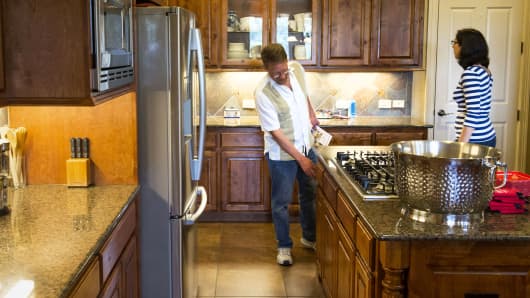What homeowners tell us about the Super Tuesday vote
Talk of the housing market, housing affordability, credit availability — really anything having to do with most Americans’ single largest investment — has been conspicuously absent from the political conversation in this election cycle. Voters, however, tend to vote with their pocketbooks, and their homes take up an awful lot of space in those cluttered bags.
“The biggest problem is that no candidate has any idea what to do about fixing housing. It was easy eight years ago because the plans were about stabilizing the housing market and helping those at risk of foreclosure because of temporary economic distress. Candidates are really good at pushing emergency solutions and one-time programs,” said Jaret Seiberg, financial services policy analyst at Guggenheim Securities.
The housing “crisis” is largely over, but there is still plenty of repair work to be done, namely fixing the housing finance system. Fannie Mae and Freddie Mac continue under government conservatorship, eight years after the fact, and are still paying all their profit back to the U.S. Treasury, ironically putting them in danger of needing another bailout. Political candidates don’t seem to want to touch that complicated conundrum, nor do they want to address the more basic issue of weakening housing affordability, as home prices and rents soar. Perhaps, it is because they don’t have to.
But voters have expressed big frustrations about the economy, of which housing is a significant part. That’s why Super Tuesday becomes so important. Super Tuesday is largely thought to be when the primaries and caucuses move from local to national, as voters in 12 states and one U.S. territory go to the polls next Tuesday, March 1. Victories by candidates on that day could mean a huge push in momentum for their campaigns.
It is worth noting that the 12 states holding contests, Alabama, Alaska, Arkansas, Colorado, Georgia, Massachusetts, Minnesota, Oklahoma, Tennessee, Texas, Vermont and Virginia, were not only less affected by the housing crisis, but have stronger housing markets today than most other states in the nation.
The states voting and holding caucuses saw half as many foreclosure sales — as a percentage of all sales — between 2008 and 2012 than states not holding contests, according to a new report from Trulia, a real estate company owned by Zillow Group. In addition, the median listed home price in Super Tuesday states has risen about 50 percent during the last four years and is now 7.7 percent higher than the median home price in states not holding contests — the Super Tuesday median home was worth 2.8 percent less in 2011.
“For candidates making appeals about income inequality, the lack of quality jobs and the sting of the financial crisis, that message may not resonate as much with voters in Super Tuesday states,” noted David Weidner, Trulia’s managing editor of housing economics research.
There are some Super Tuesday states, however, that are underperforming in the housing recovery. The median home price in Vermont has seen no gains in the last five years — down just 0.4 percent. Median home prices in Alabama and Arkansas are up 7.1 percent and 8.4 percent, respectively, but those are below the double-digit gains seen nationally. This, as the median house price in Texas is up 50 percent in the last five years and has risen nearly 40 percent in Colorado.
“This is telling us that housing is not in crisis any more. Voters aren’t demanding solutions. They are not prioritizing it. So that means the candidates are under no pressure to address a complex question with no good solutions,” added Seiberg.
[Source:- CNBC]


